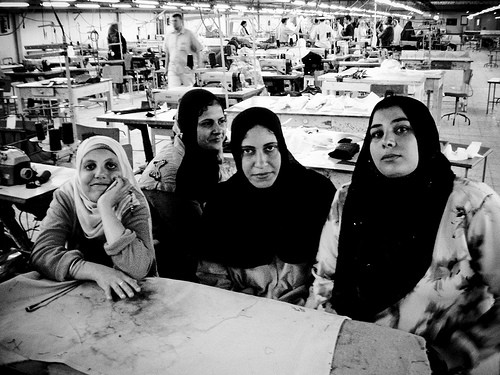Factories in Egypt are now a battle front for the workers' rights movement that began in December 2006 when the Mahallah Al Kobra textile workers held a demonstration that reached an unprecedented number of 10, 000 demonstrators and launched what experts labeled as the biggest wave of strikes in the country since the 1940s.
The workers' anger that led to these demonstrations was fueled by the neo-liberal privatization policies carried out by the current prime-minister, Ahmad Nazif's, government which resulted in thousands of workers losing their jobs and led to an increase in the inflation rate that is currently estimated at around 12% while salaries have not increased since the 1970s. All this left the majority of the Egyptian population destitute. "We felt that we were dead and so had nothing to lose by demonstrating" El-Sayyed Habib, one of the workers' movement leaders said.
What really stood out in these demonstrations, apart from the huge number of workers participating in each of them, was the fact that most of these events were led or initiated by women. These women not only participated during the daytime activities but have also gone against social norms by spending the nights in their factories during sit-ins instead of going back to sleep in their homes as "respectable" women in society are expected to do.
While all the female leaders of the workers' movement are middle aged women, a huge percentage of the women who participated were in their 20s or younger. According to Amal, one of the female leaders, who is in her late 30s, "these young girls were too hesitant and afraid at the beginning to join but when the actual event took place they acted with more enthusiasm than the men" She said with pride.
So what made these young girls join the movement? While the older female leaders were ready to talk on their behalf the answer was difficult to get from them directly due to the semi impossibility of reaching these girls either because they work more than 12 hours a day and have no time for interviews or because they are afraid of state security secret services so, after demonstrations or strikes are over, they deny having played any role in the events that took place.
Being the lowest paid workers in the textile industry and, in more than 60% of the cases, hired with no contracts, the instability and weakness of their position makes them liable to higher risks than the older workers who are hired on stable contracts.
According to Samar El Helw, a 20 year old textile worker at the Samannoud factory, who participated in the demonstrations of 2007 before leaving her job to become a stay at home mom, she and her friends were paid only LE 40 ( 5 euros) a month! "We were happy to demonstrate because we thought that would help us get a raise, I don't work now but my friends who still do will participate in the coming demonstration since the last ones only raised our salaries to 120 pounds (15 euros) a month which is still nothing" she said, referring to the 6th of April demonstration that is expected to be the largest demonstration yet to take place.
Like El Helw, most of the girls hired in textile factories do so because, having no better job opportunities and not much skill, they are left with no other choice but to work in the garment sections of the textile factories in order to save enough money to pay for their marriage expenses or, if they are married, to support their family along with the little that the husband also contributes with. Some also continue working after marriage to support the parents. However, unlike El Helw not all women can afford to stay out of work even after marriage.
According to Karim Al Beheiri, a worker blogger and activist from Mahallah who reports on workers' militant activism throughout the country, "only 1% of female workers are able to marry and stay at home. And since less and less men and women can afford marriage today the women who do get married still have to work after marriage to support their family and children" he said.
Rania, a 22 year old textile worker, works 12 hours a day, from 8:30 am to 3:30 pm in the factory and from 5:00 pm to 10:00 pm in a shop run by a friend of her father. "I'm doing what many of my friends are doing, if I didn't have this second job I would never be able to support myself since after five years of working for the factory all I get is 160 pounds (20 euros)" she said.
Unlike older female workers who were almost all hired in compliance with the law, i.e. with a contract and full health insurance and retirement (both of which nowadays do not really cover much) these young girls are exploited.
In today's textile industry girls are only hired in the departments that require day time shifts like the garments sections. Workers in these sections are paid the least and, according to Amal, girls, in specific, are hired in positions lower than their actual qualification. They are forced, in some factories, to sign a paper stating that they would never ask to be placed in higher positions that require the qualifications that they actually have and rarely, if ever, are promoted. This is in total contrast with the condition of young men of the same qualifications who are hired as supervisors over them and have much better chances of getting promoted though their salary is still equally low.
Though the prominent role of female workers in the workers' movement might lend itself easily to a "feminist" interpretation, female workers of all ages deny the "accusation". "We don't want anything of the sort [feminist demands], we just want to have a good salary and a decent life for both of us, women and men." 29 year-old Soad said.




